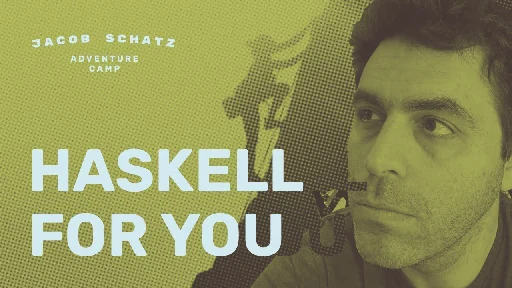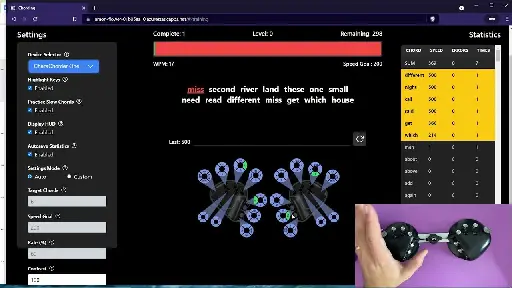
Judging by the state of the US, you're much more likely to be right than I am, you cynical bastard!
😂
I think I would just need one. We'd have to work in opposing shifts to get my billion Euro idea out the door in a more reasonable time frame than the one I have currently been working in.
Trains are awesome and I fully support them but let's not be idealistic here and pretend that true self driving cars will never happen.
Edit: jokes on you! I made a grammatical correction that makes your reply IRRELEVANT. 😉
SELF-DRIVING TECHNOLOGY SHOULD BE STANDARDIZED AND OPEN SOURCE.
Any other implementation puts profits over human lives.
I think you’re probably just a dickhead.
In my case, whether I’m wrong or not, they actively discourage me from using my brain.
I'm an intellectually overqualified filmmaker surrounded by anti-intellectuals (I routinely get made fun of for being interested in technical stuff)....and right now, I am on workman's comp with a broken foot. So: exactly what I am doing right now is exactly what I would want to be doing.
What's that?
Hanging out with my daughter in my lab,
Learning
- Haskell/Plutus
- Purescript
- using Nix to glue them together
- hacking an espresso machine (either with a RISC_V Lychee Pi or an ESP32...haven't decided yet).
Practicing:
- guitar
Blazing:
- chronic
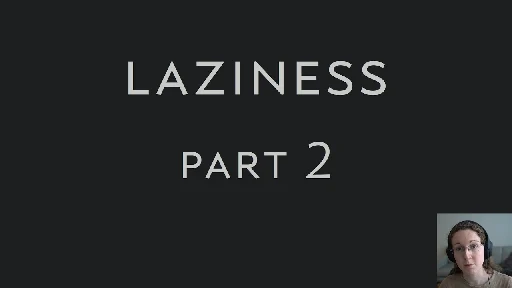
YouTube Video
Click to view this content.
> Answering the question raised at the end of Part 1, we take a look at how a hypothetical Strict Haskell would tie the compilers hands despite pervasive purity. We also examine how laziness permits optimizations that come with no intrinsic cost and compare its benefits to a strict language with opt-in laziness. > > Part 1: > > • Laziness in Haskell — Part 1: Prologue > Series Playlist: > > • Laziness in Haskell > > — > Contact: > • Tweag Website: https://www.tweag.io/ > • Tweag Twitter: https://twitter.com/tweagio > • Alexis King's Twitter: https://twitter.com/lexi_lambda
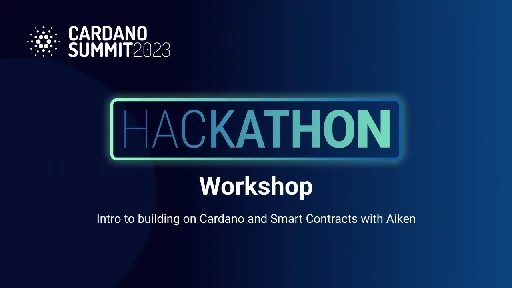
YouTube Video
Click to view this content.
> In the second webinar from our Hackathon series, Fabian Bormann provides an intro into building on Cardano including a list of tools to support you. Next, Mateusz Czeladka discusses how to harness the power of smart contracts with Aiken. > > Click the link below to learn more and to register for the Cardano Summit Hackathon. > https://summit.cardano.org/hackathon/
The Finest Possible Caprese Sandwich:
- fresh Baked Stirato Italian Baguette
- fresh Mozzarella di bufala
- fresh-picked Heirloom Italian Genovese Basil
- fresh-picked San Marzano Tomatoes
- Frantoia 100% Italian Extra Virgin Olive Oil
- Mediterranean Sea Salt
- Giuseppe Giusti Premio Italian Balsamic Vinegar
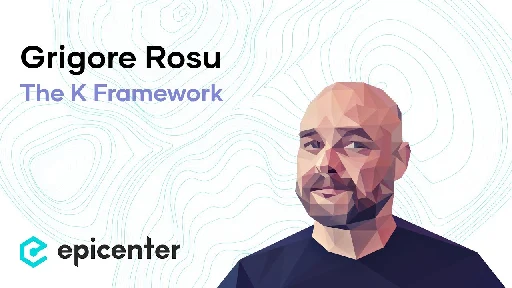
YouTube Video
Click to view this content.
> In the past few years, we witnessed the development of multiple smart contract languages - Solidity, Viper, Michelson, Scilla etc. These languages need to enable developers to write correct, predictable behavior smart contract code. Each language development effort therefore ends up spending resources into building formal verification toolsets, compilers, debuggers and other developer tools. > In this episode, we are joined by Grigore Rosu, Professor of computer science at UIUC [University of Illinois at Urbana-Champaign] for a deep dive into the K framework. The K framework is mathematic logic and language that enables language developers to formally define all programming languages; such as C, Solidity and JavaScript. Once a language is formally specified in the K framework, the framework automatically outputs a range of formal verification toolsets, compilers, debuggers and other developer tools for it. Updates to the language can be made directly in K. This technology has massive implications for smart contract programming language development, and formal verification efforts in the blockchain space. > We also cover his efforts to express the Ethereum virtual machine using the K framework, and to develop a new virtual machine technology, called IELE, specifically tailored to the blockchain space. Check out the episode to understand a game changing technology in the formal verification and smart contract safety space. > > Topics discussed in this episode: > - Grigore's background with NASA and work on formally verified correct software > - Motivations to develop K framework > - Basic principles behind the operation of K framework > - How K deals with undefined behavior / ambiguities in a language definition > - The intersection of K framework and smart contract technology > - Runtime Verification's collaboration with Cardano > - KEVM and IELE, smart contract virtual machines developed by Runtime Verification > - Broader implications of the K framework for the blockchain industry
I'm finding the signal to noise ratio is higher here. Much higher quality content at the moment. I even see some bots that post the entire article rather than just linking it. I hope that catches on.
In my experience, Voyager is still pretty buggy too. For example, try editing a post then go to do anything else after the fact. I always have to restart the whole app when I go to edit a post I made. They have a ton more features than anyone else but there are still tons of bugs.
react native is another layer and lags behind the dev of swift by at least a year. This is a huge problem for new api's like SwiftUI, in my experience. Ps. Native is ALWAYS better than an approximation of native.
Yes. Case in point: there are at least 10 Lemmy iOS apps. I'll give you ten guesses on which ones are actually native Swift...
There are a quite a few Android apps in progress too. How many are written in Kotlin?
YouTube Video
Click to view this content.

YouTube Video
Click to view this content.

YouTube Video
Click to view this content.
Mlem is my favorite too but they have a long way to go to catch up to Memmy for most of the functionality. It feels very solid compared to Memmy, though.
Yes. What a strange question...as if hivemind fads are somehow relevant to the merits of a technology.
There are plenty of useful, novel applications for AI just like there are PLENTY of useful, novel applications for crypto. Just because the hivemind has turned to a new fad in technology doesn't mean that actual, intelligent people just stop using these novel technologies. There are legitimate use-cases for both AI and crypto. Degenerate gamblers and Do Kwan/SBF just caused a pendulum swing on crypto...nothing changed about the technology. It's just that the public has had their opinions shifted temporarily.
Over the last decade, free software developers have been repeatedly tempted by development tools that offer the ability to build free software more efficiently or powerfully.
The only cost, we are told, is that the tools themselves are nonfree or run as network services with code we cannot see, copy, or run ourselves. In their decisions to use these tools and services—services such as BitKeeper, SourceForge, Google Code and GitHub—free software developers have made “ends-justify-the-means” decisions that trade away the freedom of both their developer communities and their users. These decisions to embrace nonfree and private development tools undermine our credibility in advocating for software freedom and compromise our freedom, and that of our users, in ways that we should reject.
In 2002, Linus Torvalds announced that the kernel Linux would move to the “BitKeeper” distributed version control system (DVCS). While the decision generated much alarm and debate, BitKeeper allowed kernel developers to work in a distributed fashion in a way that, at the time, was unsupported by free software tools—some Linux developers decided that benefits were worth the trade-off in developers' freedom. Three years later the skeptics were vindicated when BitKeeper's owner, Larry McVoy, revoked several core kernel developers' gratis licenses to BitKeeper after Andrew Tridgell attempted to write a free replacement for BitKeeper. Kernel developers were forced to write their own free software replacement: the project now known as Git.
Of course, free software's relationships to nonfree development tools is much larger than BitKeeper. The source to the free software development support service SourceForge was once available to its users but its authors have returned to a completely closed model. While SourceForge is built using free software, SourceForge users interact with the software over the web. Because users never have any copy of the SourceForge software, they can never demand source. Similar projects like CollabNet's Tigris.org, Google Code's “Open Source Project Hosting” services, and GitHub, each served similar purposes and have kept their code similarly out of reach. Their services are often provided without charge and promoted for free software development, but this commitment does not extend to their own software that runs the development platforms. The source code to each of these systems remains private and unmodifiable by the developers using the services.
These nonfree development tools present a dilemma for many free software developers. The goal of many of these tools is, through more efficient free software development, more free software and more freedom. CollabNet, Google and GitHub each claim to want free software to succeed and claim they want to help it. For a series of reasons though these companies choose to support software freedom through means that are less in line with free software ethics than the ones they seek to create. The result is developers who are disempowered. The software freedom of the code these hackers produce is contingent on unacceptable exclusivity.
First, the use of nonfree tools sends an unacceptable message to users of the free software produced. “Software freedom is important for you as users,” developers seem to say, “but not for us.” Such behavior undermines the basic effectiveness of the strong ethical commitment at the heart of the free software movement. As those that are already committed to free software, we should demonstrate that we can succeed—and thrive—using free software. We should support free alternatives to proprietary systems such as Savane which can replace SourceForge or Google Code and runs GNU Savannah, or Gitorious which can replace GitHub—by using them and by improving them in the areas where they fall short.
Secondly, we should realize that, going forward, the software we produce is only as free as the software it depends on for its continued use, distribution, and evolution.
The GNU GPL license and source code mean little to a user attempting to modify a program without free access to the software required to make that modification. It is not only developers' freedom at stake but, eventually, their users and all future “downstream” developers as well. Those choosing to use nonfree tools put everyone at the whim of the groups and individuals who produce the tools they depend on.
While proprietary development tools may help free software developers create more free software in the short term, it is at an unacceptable cost. In the controversial area of private software and network services, free software developers should err on the side of “too much” freedom. To compromise our principles in attempts to achieve more freedom is self-defeating, unstable, and ultimately unfair, to our users and to the larger free software development community.
Just as the early GNU maintainers first focused on creating free tools for creating free software, we should ensure that we can produce software freely and using unambiguously free tools. Our failure to do so will result in software that is, indirectly, less free. We should resist using tools that do not allow us the freedoms we are trying to provide our users in the development of their software and we should apply pressure on the producers of our development tools. Free software has not achieved success by compromising our principles. We will not be well served, technically, pragmatically, or ethically, by compromising on freedom of the tools we use to build a free world.

cross-posted from: https://programming.dev/post/719255
> Back Cover Text > > The software development community widely acknowledges that domain modeling is central to software design. Through domain models, software developers are able to express rich functionality and translate it into a software implementation that truly serves the needs of its users. But despite its obvious importance, there are few practical resources that explain how to incorporate effective domain modeling into the software development process. > > Domain-Driven Design fills that need. This is not a book about specific technologies. It offers readers a systematic approach to domain-driven design, presenting an extensive set of design best practices, experience-based techniques, and fundamental principles that facilitate the development of software projects facing complex domains. Intertwining design and development practice, this book incorporates numerous examples based on actual projects to illustrate the application of domain-driven design to real-world software development. > > Readers learn how to use a domain model to make a complex development effort more focused and dynamic. A core of best practices and standard patterns provides a common language for the development team. A shift in emphasis—refactoring not just the code but the model underlying the code—in combination with the frequent iterations of Agile development leads to deeper insight into domains and enhanced communication between domain expert and programmer. Domain-Driven Design then builds on this foundation, and addresses modeling and design for complex systems and larger organizations. > > Specific topics covered include: > > - Getting all team members to speak the same language > - Connecting model and implementation more deeply > - Sharpening key distinctions in a model > - Managing the lifecycle of a domain object > - Writing domain code that is safe to combine in elaborate ways > - Making complex code obvious and predictable > - Formulating a domain vision statement > - Distilling the core of a complex domain > - Digging out implicit concepts needed in the model > - Applying analysis patterns > - Relating design patterns to the model > - Maintaining model integrity in a large system > - Dealing with coexisting models on the same project > - Organizing systems with large-scale structures > - Recognizing and responding to modeling breakthroughs > > With this book in hand, object-oriented developers, system analysts, and designers will have the guidance they need to organize and focus their work, create rich and useful domain models, and leverage those models into quality, long-lasting software implementations. >
The funny thing is, OP’s link works on Memmy and yours doesn’t.
An axiom-free formalization of category theory in Coq for personal study and practical work - GitHub - jwiegley/category-theory: An axiom-free formalization of category theory in Coq for personal s...
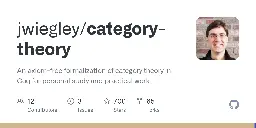
>This development encodes category theory in Coq, with the primary aim being to allow representation and manipulation of categorical terms, as well realization of those terms in various target categories.
Listen to regular interviews with the Haskell community. The podcast covers news, libraries, and whatever other topics we wander onto with our guests.
I listen to this (now very old) episode often to get inspired.
When John starts talking about compiling to categories, at around 14:40 to around 30:00, it gets REALLY interesting.
*😁😁 Hoping to bring this kind of discussion to the new Formal Methods community. 😁😁 * Here's the work he talked about: Compiling to categories by Conal Elliott
I need someone to get into the weeds on compiling programs to "axiomatized closed categories". What are the implications? What are the ramifications?
In the first episode, to honour the name of our show, we will take a look at the `unfoldr` function and discuss how it works and how it can be used.This epis...
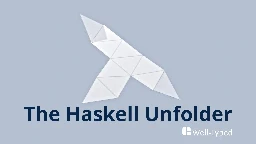
A library to turn Nix Flake attribute sets into Github Actions matrices [maintainer=@adisbladis] - GitHub - nix-community/nix-github-actions: A library to turn Nix Flake attribute sets into Github ...
![GitHub - nix-community/nix-github-actions: A library to turn Nix Flake attribute sets into Github Actions matrices [maintainer=@adisbladis]](https://programming.dev/pictrs/image/293ae8e8-4c96-4a09-b577-7fd01a44c2e7.png?format=webp&thumbnail=256)
#### **Does God Code in Haskell?**Professor and accomplished programming language researcher Philip Wadler believes that typed lambda calculus was discovered not invented -- part of the underpinnings of the universe itself. As a result, functional programming languages are more fundamental and deepl...
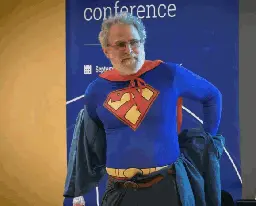
Here's the conclusion of the paper Wadler is referring to in this interview:
> Proposition as Types informs our view of the universality of certain programming languages. The Pioneer spaceship contains a plaque designed to communicate with aliens, if any should ever intercept it. They may find some parts of it easier to interpret than others. A radial diagram shows the distance of fourteen pulsars and the centre of the galaxy from Sol. Aliens are likely to determine that the length of each line is proportional to the distances to each body. Another diagram shows humans in front of a silhouette of Pioneer. If Star Trek gives an accurate conception of alien species, they may respond “They look just like us, except they lack pubic hair.” However, if the aliens’s perceptual system differs greatly from our own, they may be unable to decipher these squiggles. What would happen if we tried to communicate with aliens by transmitting a computer program? In the movie Independence Day, the heroes destroy the invading alien mother ship by infecting it with a computer virus. Close inspection of the transmitted program shows it contains curly braces—it is written in a dialect of C! It is unlikely that alien species would program in C, and unclear that aliens could decipher a program written in C if presented with one. What about lambda calculus? Propositions as Types tell us that lambda calculus is isomorphic to natural deduction. It seems difficult to conceive of alien beings that do not know the fundamentals of logic, and we might expect the problem of deciphering a program written in lambda calculus to be closer to the problem of understanding the radial diagram of pulsars than that of understanding the image of a man and a woman on the Pioneer plaque. We might be tempted to conclude that lambda calculus is universal, but first let’s ponder the suitability of the word ‘universal’. These days the multiple worlds interpretation of quantum physics is widely accepted. Scientists imagine that in different universes one might encounter different fundamental constants, such as the strength of gravity or the Planck constant. But easy as it may be to imagine a universe where gravity differs, it is difficult to conceive of a universe where fundamental rules of logic fail to apply. Natural deduction, and hence lambda calculus, should not only be known by aliens throughout our universe, but also throughout others. So we may conclude it would be a mistake to characterise lambda calculus as a universal language, because calling it universal would be too limiting.
🎉 We've got a new #SnowfallOrg repository today! 🎉 I've written a (hopefully working) #Nix parser in #TypeScript. I plan on building off of this to try and improve the dev experience of working with Nix Flakes. Stay tuned for that! https://github.com/snowfallorg/sleet #NixOS
Haskell recap for week 26/2023 with articles, projects and tutorials.
Charles Scalfini, the CTO of Panoramic Software, makes the case for why programmers should make the leap to functional programming, which promises more maintainable code, and eliminates some of the problems inherent to conventional languages.
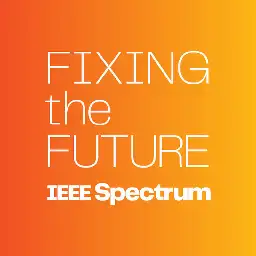
A podcast with transcript which may help explain fp to laymen.
> The Fediverse – a network comprised of Mastodon, Pleroma and other adjacent projects – suffers from the same glaring contradiction. Similar to email nodes, servers (known as Instances within this network) are branded around common interests, political beliefs or sexualities. Users are encouraged t...
 demesisx @programming.dev
demesisx @programming.dev Plutus, Haskell, Nix, Purescript, Swift/Kotlin. laser-focused on FP: formality, purity, and totality; repulsed by pragmatic, unsafe, "move fast and break things" approaches
---
AC24 1DE5 AE92 3B37 E584 02BA AAF9 795E 393B 4DA0
